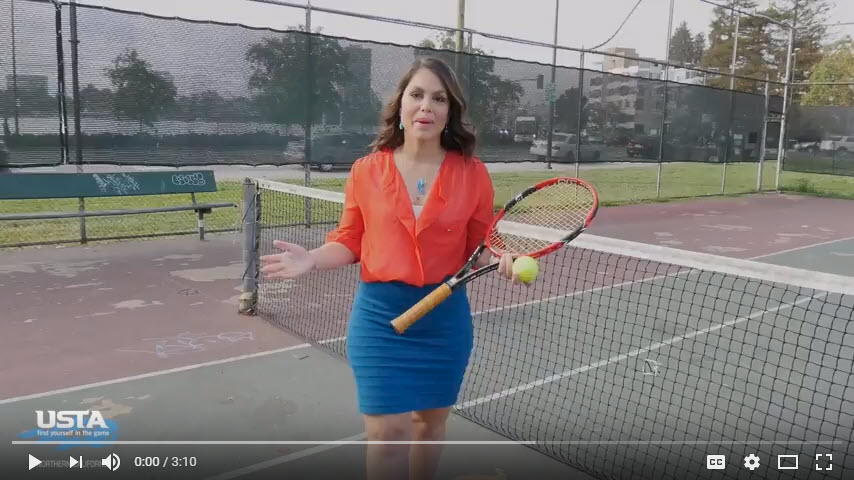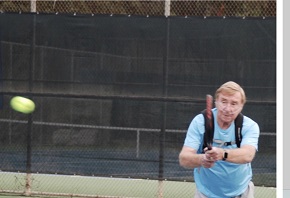Faces of COPD: Barry Wood is Staying in the Game
Posted on July 02, 2018 |
Meet Barry Wood, a longtime United States Tennis Association (USTA) NorCal tennis player. In 2006, Barry was diagnosed with chronic obstructive pulmonary disease (COPD) and in 2015 was told he would need supplemental oxygen for any strenuous activity. An avid tennis player, the diagnosis was life-changing. However with an optimistic outlook and a little ingenuity, Barry has been able to manage his COPD and stay in the game.

“In 2006 I noticed I was getting short of breath while playing tennis. I put it down to old age but then I happened to mention it to a friend at a party who knew a lot about the subject of COPD. He suggested I get checked out by a doctor,” says Barry.

At the time Barry had never heard of COPD, but decided to follow up on his friend’s recommendation. He received a formal COPD diagnosis and started using inhalers – but that didn’t stop him from pursuing his hobbies. He continued playing tennis socially and competitively on USTA teams.
In 2015 he contracted pneumonia, and from that point on he noticed his breathing was getting worse. His doctor prescribed a 6 minute walk test. Barry was concerned he would require the use of supplemental oxygen for the rest of his life. The results indicated he would need oxygen, but only when exerting himself.
“My first thoughts were that my tennis days were over. I was devastated.”
He then started looking into the world of medical oxygen and learned about the availability of small, lightweight portable oxygen concentrators (POCs).
“This was during the time my wife and I were planning a trip to the UK and noticed the airlines had specific requirements before they would allowed me to fly!” says Barry.
He soon learned that the airline:
- Would not provide an individual with oxygen during the flight.
- Would only allow one to travel with an approved POC.
- Would not provide an individual with electrical power, and s/he must have sufficient battery power to last from the time s/he took off to the time the plane reached its destination -- including any layovers.
- Required an individual to complete forms signed by his/her doctor beforehand to receive permission to fly.
Because of the decreased pressure in the plane at altitude, an individual like Barry would have to use oxygen for the duration of the flights.
“In my case traveling from San Francisco to Manchester, UK via Chicago it meant I had to have 4 double and two single batteries for the trip!”
Barry decided that if he wanted to continue using commercial airlines and play tennis for as long as possible, he would have to purchase a small POC and six batteries.
“This was a very good investment despite the high cost. I now play tennis and pickle ball with the POC in a backpack.”
Since his diagnosis, Barry’s wife and family have served as his strength and support system. Together, they have learned as much about COPD as possible.
“I accepted the fact my life would be more difficult once diagnosed with COPD and that it wasn’t going to get better. I try to live life now as it was before but accept my limitations and try to work around them as much as possible.”
Barry says he tries to put vanity aside so it doesn’t restrict him in any way. He stays active as much as possible and is a firm believer in attending a pulmonary rehab course at a local hospital gym. “It’s a great way to meet new friends and help with your overall mental and physical health.”
Barry still plays some tennis and pickle ball twice a week, but has accepted the fact it gets harder as time passes. Even still, he remains optimistic and still has had significant wins despite COPD.
“In 2017 our local USTA tennis team won the regional championship and we attended the sectional competition to see which team would go to the USA finals. The team did very well but fell short of progressing to the finals. It was a memorable occasion as my partner and I won our match and is probably the last time I will play on a competitive team,” says Barry.
For anyone living with COPD, Barry’s believes an individual should:
- Learn as much as you can about the subject.
- Stay active and exercise for as much as possible for as long as possible.
- Try to live as normal a life as much as possible for as long as possible.
- Take vanity out of the equation.
- Take advantage of the latest medication and equipment available.
Are you one of the Faces of COPD? Share your story by writing to the COPD Foundation at info@copdfoundation.org.